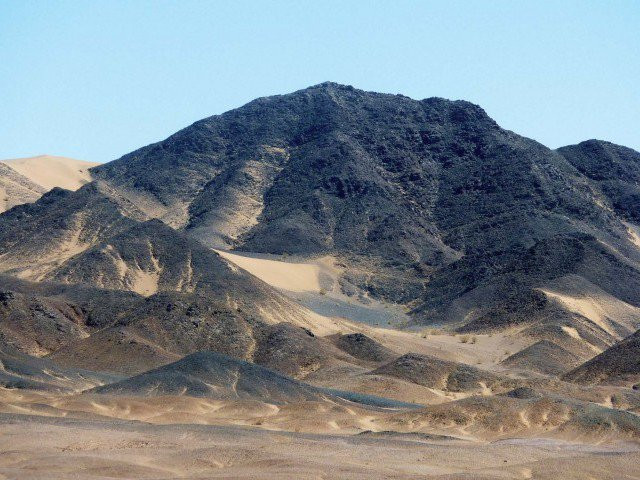Reko Diq: Contradictory claims made before PAC about alleged graft
Scientist says mining firm gave international court list of Pakistanis who sought bribes from it

Scientist says mining firm gave international court list of Pakistanis who sought bribes from it. PHOTO: FILE
The most astonishing claims were made by the members of the legal team representing Pakistan in the international court of arbitration and by scientist Dr Samar Mubarakmand, according to people privy to discussions that took place during an in-camera meeting of the PAC.
The PAC held second consecutive in-camera meeting in its efforts to find out the reasons that brought huge embarrassment for the country at an international forum in addition to exposing it to $11.34 billion damages claims, filed by the Tethyan Copper Company (TCC).
Leader of the Opposition in the National Assembly Khursheed Shah chaired the meeting.
Dr Samar told the PAC that the TCC – while filing claims for international arbitration before International Court for Settlement of Investment Disputes (ICSID) of the World Bank – had submitted a list of eight people that sought bribes from it, at least two officials told The Express Tribune.
But a member of the legal team immediately contradicted Dr Samar’s claim that the TCC had submitted any such list to the ICISD. When contacted, Dr Samar declined to comment, saying the meeting was held in-camera.
In 2012, the TCC filed claims for international arbitration before the ICSID after Balochistan government turned down a leasing request from the company. The ICSID proceedings are in the quantum stage where the TCC has claimed an amount of $11.431 billion in damages.
The claim is supported with a number of expert reports and financial models, the PAC was informed. The TCC expects a ruling on the quantum of damages in April 2019.
An official of the Balochistan government claimed before the PAC that the province’s former caretaker chief minister Mir Naseer Mengal was responsible for signing a weak legal agreement with the TCC and subsequent amendments to it.
The legal adviser claimed that the international arbitrators have stopped the provincial government and other parties from sharing evidence in a criminal inquiry being carried out by the National Accountability Bureau (NAB).
Pakistan ‘faces $11.43b damages claims’ in Reko Diq mining case
However, the two officials privy to the PAC proceedings told The Express Tribune that a majority of the PAC members did not believe in what the legal minds told them. In order to ascertain the claim, the PAC decided to ask the NAB chairman to appear before it in the next meeting, they added.
The NAB chairman would be asked to explain the reasons for delay in completing an inquiry initiated in June 2015, according to the officials. The legal team told the PAC that the authorities have been barred from sharing any evidence with the NAB.
In June 2015, the NAB received a complaint against provincial government officials for their alleged corruption in the Reko Diq scam. The case is now one of the 179 mega corruption cases pending decision and the NAB is giving regular updates with regard to it to the Supreme Court.
In its latest report, which is also available on the anti-graft body’s website, the NAB had informed the apex court that the inquiry “will be finalised upon receipt of information from foreign jurisdiction”.
The bungling of Reko Diq
During Thursday’s in-camera briefing, Balochistan’s Mines and Minerals Development Department and the legal team gave answers to the questions that the PAC members had raised in the previous meeting.
The PAC had raised serious questions over the manner in which the provincial governments allowed change of ownership from one Australian company to two others from 1998 to 2006 despite the fact that there was no such clause in the original Chagai Hills Joint Venture Exploration Agreement (Chejva).
In the ICSID proceedings, the jurisdiction and liability have been decided against Pakistan, as the tribunal has found that Pakistan has breached the Bilateral Investment Treaty of 1998 between Pakistan and Australia.
According to the ICSID, the Supreme Court’s decision to declare the mother joint venture agreement illegal did not diminish the TCC’s investment. According to the provincial government, even malpractices and corruption by the TCC did not deny it investment rights.
NAB sets up over 1,800 character building societies
Reko Diq is part of the Tethyan Magmatic Arc, which is a mineralised belt that originates from Eastern Europe and runs through Iran and Afghanistan and turns upward towards Pakistan.
In the two PAC meetings, it has transpired that the main reasons behind the fiasco surrounding the Reko Diq case include signing of a weak legal agreement, the 14 changes that the provincial agreement made during the midcourse in the original deal and the SC’s decision to annul the lease agreement.
In 2013, the SC declared that Chejva and all of its successor agreements were void ab initio and that the TCC had no legal rights to explore and mine in Reko Diq.
The PAC on Thursday also asked the Balochistan government officials to build in their in-house capacity to handle such mega investment cases.



















COMMENTS
Comments are moderated and generally will be posted if they are on-topic and not abusive.
For more information, please see our Comments FAQ